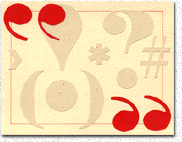| Monday, May 17, 2004 |
| GTN: Getting To Now |
 A post I saw yesterday on The MasterList's blog, which seems to not work right now in my browser, talks about Getting Things Done and Getting To Now. Since they made them into the acronyms of GTD and GTN, it almost sounds like a movement, like they suggest, or as memes at least. A post I saw yesterday on The MasterList's blog, which seems to not work right now in my browser, talks about Getting Things Done and Getting To Now. Since they made them into the acronyms of GTD and GTN, it almost sounds like a movement, like they suggest, or as memes at least.
"Getting Things Done" is a book by David Allen. It is about getting organized. Great book. Specifically it is about how to get things out of your head and onto a list that works for you. All the things you're trying to remember that happened or should happen or might happen. If you notice you're our of staples for your stapler and you decide you need to buy some, if then, the next time you walk by an office supply store, you don't remember that, your organizational system is failing. The idea in Getting Things Done (GTD) is to have it ALL down on appropriate lists, which will pop up for you in the right place and time. Might be on paper, might be a program. The result of doing that well would be that there's nothing that has to bounce around in your head that you must remember to do or not do. Which frees up your awareness for the present moment, rather than using it on remembering what you should do tomorrow or in five minutes or the next time you're next to a phone. Voila, Getting To Now. So, getting all your To-Do items, and all your I'm-Trying-To-Pay-Attention-To items out of your head and into a workable system, is one way of doing it. There are many others, of course. Meditation. Sharpening your senses. Jumping off of bridges with a rubber band tied to your ankles. Therapy or mental practices to overcome the Mind's zillion little traps and fallacies that try to keep you stuck in the past and the future. Despite that life is happening only Here and Now, and nowhere else, ever. Getting To Now (GTN) might then be the umbrella label for all sorts of approaches that help you get here, and now. You're surrounded by input and systems that conspire to make you be everywhere else but here and now. They often use stimuli in the here and now as a sort of mental/emotional judo to propel you everywhere else. Advertising uses sound and vision and triggered emotions to make you think that you've gotta have something else that you don't have. Our economic system is a powerful force that knows nothing better than kicking you out of the present moment by pretending to give you an enhanced present moment. Buy NOW and don't pay before 2005!!! You end up paying off loads of things that are no longer here, and worrying about how to pay things in the future for years to come. It is one big time trap. Getting To Now would be about freeing oneself from all the traps. All the traps that convince you to live in the past and in the future, despite that those are the only places where you'll never be. So, organization helps. Organization to make space. To move those things out of your head that don't need to be there. Paying attention helps. Noticing what is here right now. Keen perceptions. Smell the roses that actually are here. And knowing the limitations of the human mind, will help. Knowing that you aren't going to arrive through thinking, because thinking is always about things that aren't here. You still need to do it sometimes. But most of the time you'd be better served by being present and dealing with what is front of you. Right now is the only time to enjoy anything. The only time to learn. The only time to fall in love. The only time to understand. The only time to act. GTN. [ Knowledge | 2004-05-17 08:31 | 1 comment | PermaLink ] More > |
| Correct Writing |
 Dave Pollard wrote a post about punctuation a little while back, referring to a New York Times op-ed piece on the same subject. Both speaking for the inevitability of relaxing all the rules for how one is supposed to write. Dave Pollard wrote a post about punctuation a little while back, referring to a New York Times op-ed piece on the same subject. Both speaking for the inevitability of relaxing all the rules for how one is supposed to write.Anyone under 25 would probably think this post, and Mr Rosenthal's op-ed, pointless and esoteric. The young are learning to think and write almost entirely in real time, precisely the way they talk, and they have willingly traded off the time and the value that comes from careful composition, editing and reflection, in favour of an iterative, 'successive approximation' means of communicating. In such a world, punctuation may soon be seen as an affectation, not a tool for comprehension.It is probably true that anybody under 25 won't even care, or have no clue what any fuss would be about. The only reason I'm interested in punctuation and the 'correct' way of writing is because I'm very aware that I'm not following the rules, and I don't intend to. So, discussing the subject a bit gives me a bit of a cover and a chance to explain. I frequently start sentences with 'and' or 'but' or 'so'. I often write sentences without any verb. The rule says that if you need a comma after a section in quotes, the comma goes inside the quotes. It looks stupid and I ain't doing it. I feel a little guilty using an apostrophe to say MP3's, but it just happens to be more clear. I guess I've found that I communicate better if I write somewhat like I speak. So, I tend to use commas as much to indicate natural pauses as in any references to where they're 'supposed' to be. So, yes, maybe the different cultures will clash. Or maybe the old rules will just die quietly as nobody cares any longer. To be understood is more important than being correct. [ Culture | 2004-05-17 09:24 | 2 comments | PermaLink ] More > |